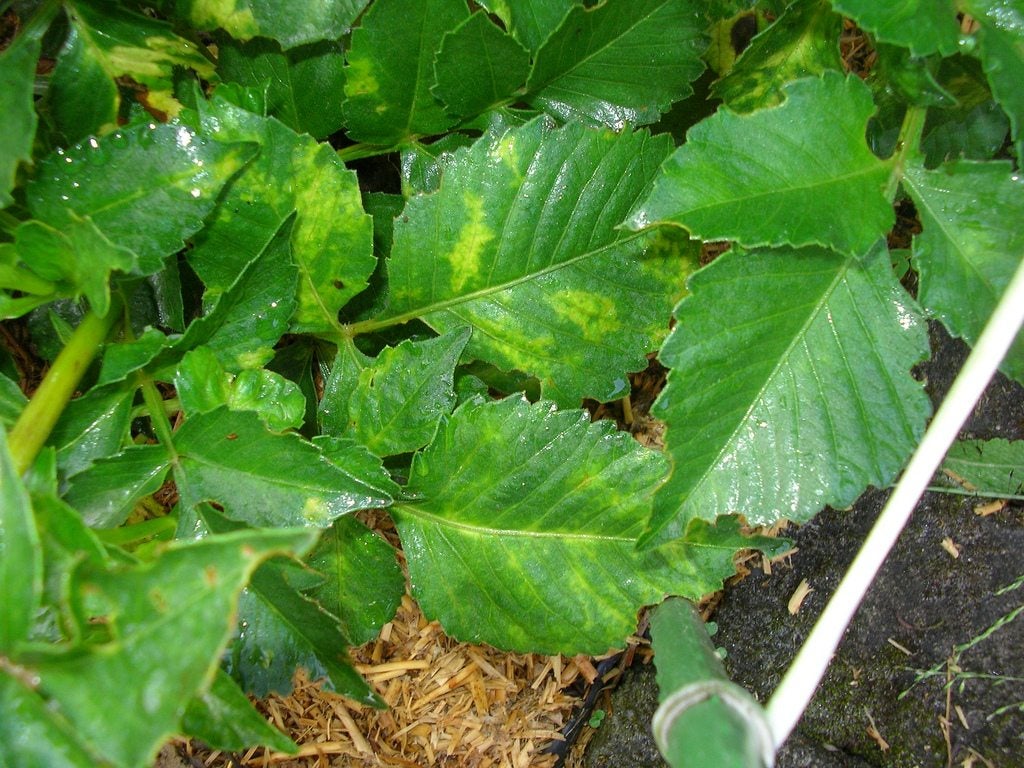Yellow Dahlia Foliage: What Causes Dahlia Leaves To Turn Yellow


Sign up for the Gardening Know How newsletter today and receive a free copy of our e-book "How to Grow Delicious Tomatoes".
You are now subscribed
Your newsletter sign-up was successful
Few species of flower offer the sheer variety and diversity of form and color as the dahlia. These magnificent plants are such showstoppers that there are entire conventions and contests devoted to their beauty and breathtaking shape. That being said, yellowing dahlia plants are common, and the condition may be caused by disease, insect infestation, improper or poor soil, or general site conditions. Find out what causes dahlia leaves to turn yellow and save your plant from foliar distress.
What Causes Dahlia Leaves to Turn Yellow
Plants can become ill for a host of reasons. The actual cause may take some sleuthing to discover. Keep in mind that if this occurs towards the end of the growing season, it is likely due to the plant getting ready for its normal dormancy period.
Cultural Reasons for Dahlia Leaves Yellowing
If you notice your dahlias turning yellow early in their growth cycle, it could be the soil or cultural problems. They love full sun locations in soil which is slightly acidic. They thrive in hot conditions and prefer a deep watering once per week.
- If the soil is heavy clay, it will not dry out and percolate properly. This waterlogs the roots and tubers.
- Improper soil pH and condition are a major cause of yellow leaves.
- Lack of magnesium or iron will also cause yellowing dahlia plants.
Dahlia Leaves Yellowing and Disease
Probably the most common cause of yellow dahlia foliage is rot and fungal diseases.
- Rotten tubers cannot support the growth of healthy foliage and blooms. Leaves fade and before long you see your dahlias turning yellow.
- Smut is a fungal disease that causes yellow mottling in leaves.
- Chlorosis occurs when the plant cannot produce enough chlorophyll and gradually the leaves will fade to a pale yellow.
- Verticular wilt is a vascular disease which causes leaves to wilt and fade.
- Mosaic diseases cause irregular yellow patches and spots on leaves.
There is no shortage of disease pathogens ready to attack a dahlia. Fortunately, good care can usually keep the plant alive until it goes dormant.
Yellow Dahlia Foliage from Pests
Many insect pests can also affect dahlia plants, resulting in yellowing of the leaves.
- Leafhoppers will be the most prevalent pests of dahlia plants. Their feeding can transmit a disease known as the “yellows.”
- Armored scale is also responsible for yellow dahlia foliage.
- Aphid damage may be yellow or white but is also accompanied by twisted and distorted leaves.
- Mites are another sucking insect that will cause leaf damage. They prefer lower leaves and those on the shady side.
Sucking insects do the worst damage but rarely kill a plant. They can cause distress due to foliage loss and reduction of plant sugars. You can control the majority of the damage by simply blasting the dahlia leaves with water and rinsing them off. Horticultural oils and soaps or neem oil are also effective at keeping their sucking activities away from your prized dahlia plants. A little extra care and you can prevent yellow dahlia foliage and have superior blooms and leaves all summer long.
Sign up for the Gardening Know How newsletter today and receive a free copy of our e-book "How to Grow Delicious Tomatoes".

Bonnie Grant is a professional landscaper with a Certification in Urban Gardening. She has been gardening and writing for 15 years. A former professional chef, she has a passion for edible landscaping.